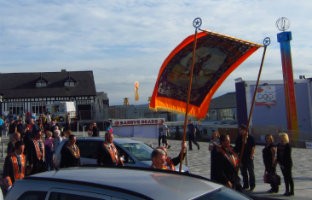After the Troubles

My family and I are on a three-week vacation in the Republic of Ireland and Northern Ireland. As we planned our trip, my wife and I felt somewhat nervous upon realizing that we and our two young daughters would be staying in the resort coastal town of Portrush, near Giant’s Causeway and the Old Bushmills Distillery in County Antrim, on the 12th of July.
The 12th is the annual commemoration by Protestants in Northern Ireland of William of Orange’s victory over James II. Tension and conflict have accompanied the marches, especially during the 30-year-long Troubles. After the Good Friday Agreement in 1998, the violence decreased significantly. But after centuries of mutual fear and antipathy, change takes time.
They say that everyone has an Ian Paisley story. My own memorable encounter with the leader of the Democratic Unionist Party occurred in 2000 at Storemont in Belfast. Gordon Shea and I were there with 20 students from Simpson College, and we had a private audience with Paisley to hear his perspective on the Troubles.
Before the meeting, a number of scholars rightly informed us that the violence in Northern Ireland was as much about economics and politics as religion. When one of the students asked Paisley why he refused at that time to negotiate with Sinn Féin, however, his animated reply reminded us of the role that religion continued to play.
Sitting immediately to my left, Paisley tapped my shoulder with the back of his hand and with a raised voice asked, “Do you expect me to sit next to a Catholic after all they have done to us?” I will never forget the stunned look on my students’ faces. Because Simpson College is a United Methodist-affiliated institution, Paisley must have assumed that I was a Protestant.
Six years later, in the Saint Andrews Agreement, Paisley committed to a power-sharing government with Sinn Féin. Given his emotional reaction to my student’s question, I was as surprised as I was pleased with his about face.
My students and I also met with Protestants and Catholics in Belfast and Londonderry who had lost loved ones to the sectarian violence of the Troubles—but who were endeavoring to forgive and to reconcile with the other. And we spent some time in Ballycastle with the Corrymeela Community, which since 1965 has offered educational programs to help foster the peace process in Northern Ireland. As a former law enforcement officer, I was struck by stories of Protestant police and Catholic youths from Belfast who participated in workshops and recreational activities together. Later, that experience would sometimes defuse tense confrontations in their city.
So I wondered what I would see last week, and especially on the 12th. Driving into Northern Ireland, we passed through a couple of small towns decorated with British flags draped from street lights and with fresh red, white and blue paint on the curbsides. The morning of the 12th, we saw some marchers with their banners assembling to parade. After dinner we happened upon another Orange parade in Portrush. As a Catholic who even has British ancestry, I felt very uncomfortable witnessing this first-hand—and trying to explain it to my seven-year-old daughter.
But even with all the flags, banners and drumming, it was a relatively small parade. Overall, marches by the Protestant unionists and loyalists have been tamer than in the past, with less in-your-face parading through Catholic neighborhoods. This gives me hope that the peace process is gaining more and more purchase here. All of the people we’ve spoken to have expressed their desire for a better future.
Yet the marches go on. In north Belfast some police were injured as loyalists and nationalists confronted each other during an Orange Order parade through the Catholic Ardoyne area. Tensions escalated Friday, both there and in Londonderry.
“No yard of road,” said the chair of the Police Federation, “is worth either an injury or the death of a police officer or a member of the public. The parade should not become a day of shame for both communities.” I’d add that it also should not become a day of shame for for the Protestant and Catholic communities, which both worship and follow the Prince of Peace.





